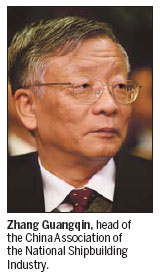-
News >Bizchina
Full steam ahead for shipbuilders' plans for market position
2011-02-17 13:43BEIJING - China plans to maintain its current global market share of 40 percent in the shipbuilding industry during the next five years, further consolidating its dominant position in the field, said Zhang Guangqin, head of the China Association of the National Shipbuilding Industry.
"To keep such a market share is by no means easy. China still lags behind South Korea and Japan in terms of technologies and production capability of high value-added vessels," Zhang said in an exclusive interview with China Daily.

"Once the world market is affected by oversupply, Chinese shipbuilders will be challenged by a higher technology threshold and new shipbuilding standards imposed by the international community," he added.
According to industry estimates for the near future, the production capacity of the global shipbuilding industry may expand by 200 million deadweight tons every year, but demand will remain at 156 million deadweight tons, with nearly a quarter oversupplied.
A deadweight ton comprises the sum of the weights of cargo, fuel, fresh water, ballast water, provisions, passengers, and crew.
In the meantime, industry analysts have predicted the Chinese shipbuilding industry will be seriously challenged by overcapacity from this year onwards.
"Now that we have enough production capacity, it's high time that we improved our technological strength and management skills. More investment will be encouraged to flow into the research and development sector," Zhang said.
According to Zhang, shipbuilders in China should upgrade their vessels to meet the growing demand of vessels with high value-added while fostering their own technologies in building vessels for special use, such as liquid gas carriers, and multi-purpose vessels. Chinese shipyards have long had a reputation for being low-priced and fast, but not sophisticated or advanced. As global demand is gradually picking up in the wake of the global financial depression, China displaced South Korea as the top global shipbuilder in 2010.
That year, the country's completed shipbuilding orders jumped by 54.6 percent year-on-year to a record high of 65.6 million deadweight tons, the volume of new ship orders rose almost three times year-on-year to 72.35 million deadweight tons, and the volume of orders in hand grew by 4.1 percent year-on-year to 195.9 million deadweight tons, according to data from the Ministry of Industry and Information Technology.
In the meantime, statistics from Clarkson, the world's largest shipping research institute, show that China took an average of 45 percent - the largest - of the global volume in the categories outlined above in 2010, followed by South Korea and Japan.
"Affected by the oversupply, international competition is becoming fiercer. Shipbuilders today across the world are participating in green economy, trying to cut their energy consumption through advanced technologies," Zhang added.
In 2010, the International Maritime Organization discussed and passed a slew of amendments which are consistent with developing environmentally friendly technologies, including cutting greenhouse gas emissions and new noise-proofing standards.
"China should also take part in making new rules and standards by developing our own technologies, or our vessels will become obsolete and end up being abandoned by the market," Zhang said.He also said that besides oversupply, appreciation of the yuan and rising costs of labor and raw materials have narrowed companies' profit margins. Ultimately, orders will only come to famous large companies, resulting in an industrial consolidation.
In 2010, China's top 20 shipbuilders accounted for 67.6 percent of the country's overall volume of completed ships, according to a report released by the China Association of the National Shipbuilding Industry.
Oversupply in the shipbuilding industry became a global concern, forcing giants in the field to withdraw from the industry.
